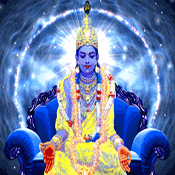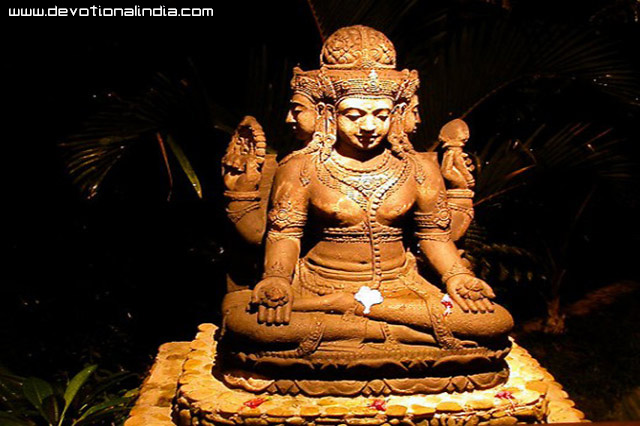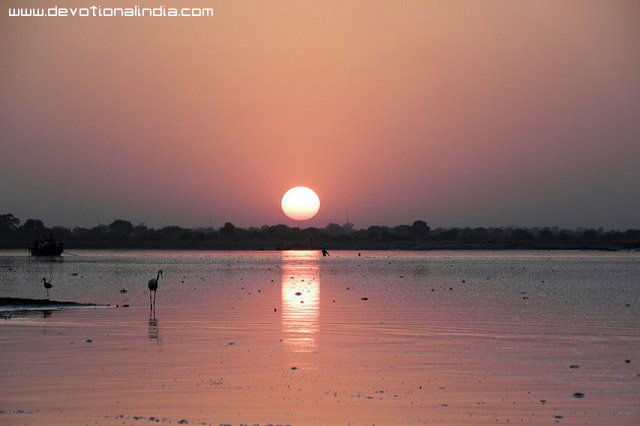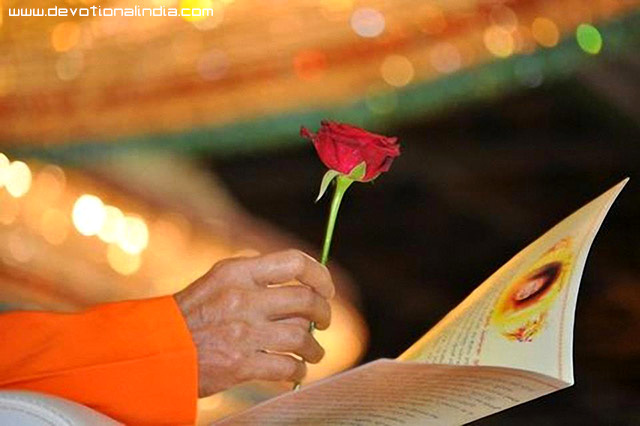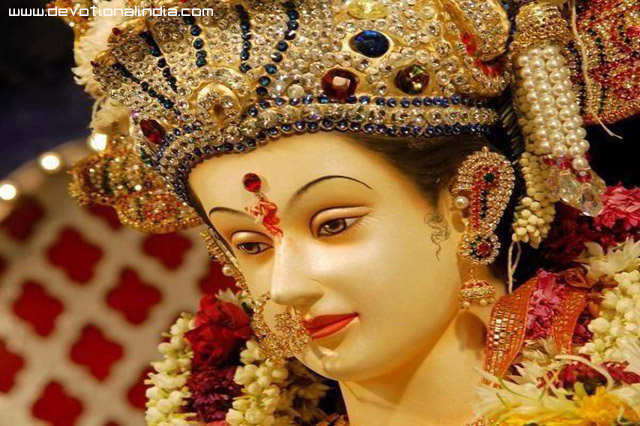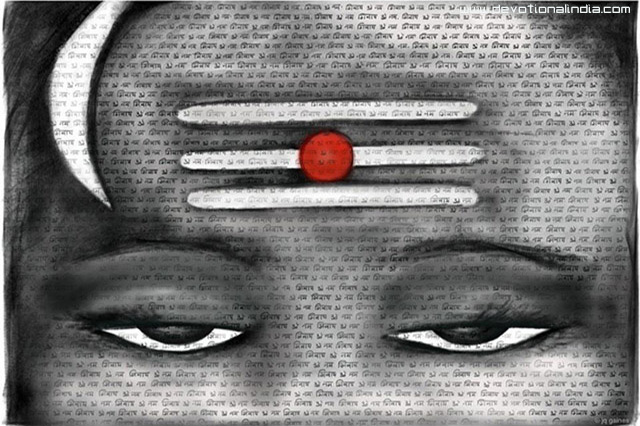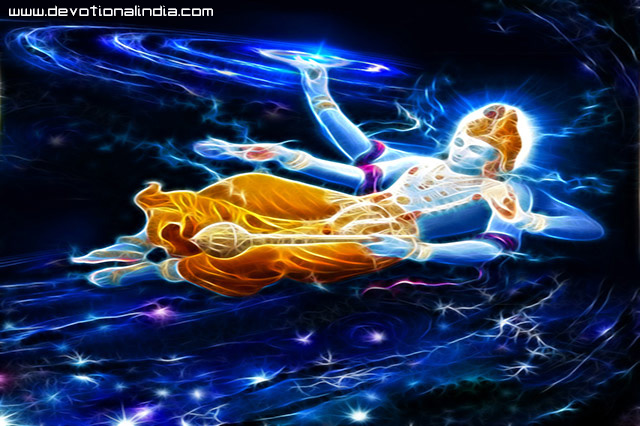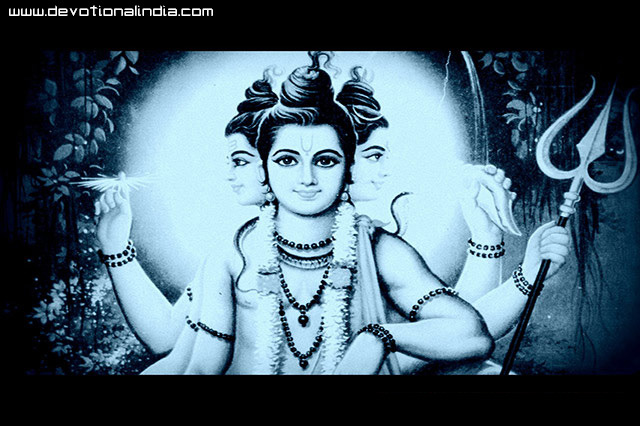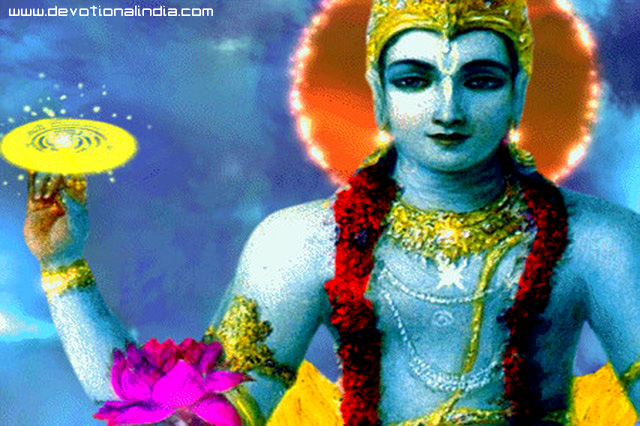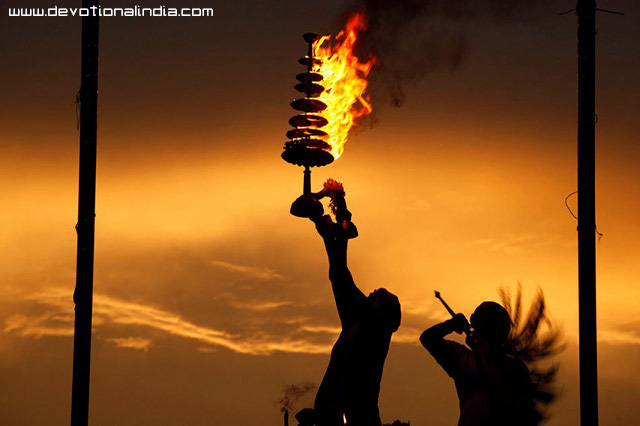
VEDAS
The Veda is the Mother of all the Sastras. The Veda emanated from God Himself as inhalation and exhalation. The great sages, who were the embodiments of the treasure gained by long ascetic practices, received Veda as a series of sounds and spread it over the world by word of mouth from preceptor to pupil. Since it was 'heard' and preserved by generations, the Veda is known as Sruthi, 'that which was heard or listened to.' The Veda is endless.
Who composed the Vedas? Until today, it has not been possible to unveil their names. Those who recited it had perhaps no desire to earn renown, for the names are nowhere seen mentioned in the Veda. May be they had attached no importance to their names, or clans or sects, or it is likely they had no kith or kin or clan. Whoever he or they may be, the sages were sure they were masters of all knowledge, for the sense of equality and equanimity found in the Veda is the innate quality of only such wise persons. So it is very appropriate to infer that the Veda was given to the world only by persons endowed with all powers.
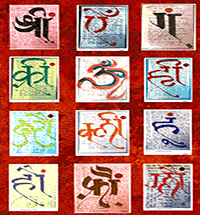 The word 'Veda' originated from the root 'Vid', meaning 'to know', "Vidana thu anena ithi Vedah", "That which reveals and makes clear all knowledge is Veda". The Veda can be mastered neither by limited intellect nor by limited experience. The sacred Veda instructs all that one requires for his spiritual advancement. It instructs one the means and methods to overcome all sorrows and grief. It instructs one in all the spiritual disciplines which can give unshaken peace. No one has understood correctly the beginning of the Veda or its end. So, it is hailed as Anaadi (Beginningless) and Sanathana (Eternal). Since the first and the last of the Veda are not known, it is Nitya, Everlasting. The intelligence of humans is tainted but since the Veda has no trace of taint, it is concluded that it cannot be a human product. So the Veda is also characterised as A-pourusheya (Non-personal).
The word 'Veda' originated from the root 'Vid', meaning 'to know', "Vidana thu anena ithi Vedah", "That which reveals and makes clear all knowledge is Veda". The Veda can be mastered neither by limited intellect nor by limited experience. The sacred Veda instructs all that one requires for his spiritual advancement. It instructs one the means and methods to overcome all sorrows and grief. It instructs one in all the spiritual disciplines which can give unshaken peace. No one has understood correctly the beginning of the Veda or its end. So, it is hailed as Anaadi (Beginningless) and Sanathana (Eternal). Since the first and the last of the Veda are not known, it is Nitya, Everlasting. The intelligence of humans is tainted but since the Veda has no trace of taint, it is concluded that it cannot be a human product. So the Veda is also characterised as A-pourusheya (Non-personal).
The Veda is its own authority. Each Vedic sound is sacred because it is part of the Veda. Those who have faith in the Veda and its authority can personally experience this. The great sages were enriched by such experiences and they have extolled it as the source of wisdom. These experiences are not bound by time or space. Their validity and value can be recognised not only in India but by people of all lands. They lay down basic truths, it can be asserted.
There are Four Vedas:
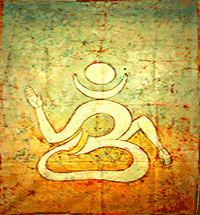
- Rig Veda
- Sama Veda
- Athara Veda
- Yajur Veda
Divided into 5 Samhithas:
- Rk-Samhitha
- Yajus-samhitha
- Saama-samhitha
- Atharva-samhitha
The Vedas have nine names by which they are denoted:
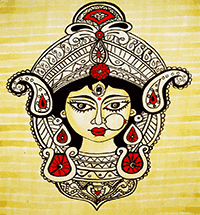
- Sruthi
- Anusrava
- Thrayee
- Aamnaaya
- Naamaamnaaya
- Chhandas
- Swaadhyaaya
- Aagama
- Nigamaagama
Vedas:
 Mother Veda has been kind to her children - the human race. To sanctify its cravings and to uplift the race, she has posited the concept of Time - and its components, the years, months, days, hours, minutes and seconds. Even gods were declared to be bound by Time. The individual or Jiva is caught in the wheel of Time and Space and rotates with it, unaware of any means of escape. But, really he is beyond the reach of Time and Space. The Veda is bent upon the task of making him know this Truth, and liberating him from this narrowness. Mother Veda is compassionate; she longs to liberate her children from doubt and discontent. She has no desire to inflame or confuse; wise men know this well.
Mother Veda has been kind to her children - the human race. To sanctify its cravings and to uplift the race, she has posited the concept of Time - and its components, the years, months, days, hours, minutes and seconds. Even gods were declared to be bound by Time. The individual or Jiva is caught in the wheel of Time and Space and rotates with it, unaware of any means of escape. But, really he is beyond the reach of Time and Space. The Veda is bent upon the task of making him know this Truth, and liberating him from this narrowness. Mother Veda is compassionate; she longs to liberate her children from doubt and discontent. She has no desire to inflame or confuse; wise men know this well.
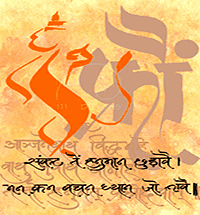 Gravitation has existed on earth since we do not know when. It had its origin along with the Creation of the Earth. The Earth and the Force of Gravitation are both inseparable, indistinguishable. Just because it is not recognised by a few or because it is not visible as such, it will be foolish to deny its existence in the Earth. But the fact is, no one knew the existence of this universal force, though it was there along with the Earth! The force was operating even when man was unaware of it. At last, after analysing various principles and observing various experiments, the Western physicist Newton announced that the Earth had the force of gravitation. The world accepted his statement and placed faith in its truth. But, the force was operating all the time, even before the announcement by Newton. It did not start operating all of a sudden, when the experiments demonstrated it.
Gravitation has existed on earth since we do not know when. It had its origin along with the Creation of the Earth. The Earth and the Force of Gravitation are both inseparable, indistinguishable. Just because it is not recognised by a few or because it is not visible as such, it will be foolish to deny its existence in the Earth. But the fact is, no one knew the existence of this universal force, though it was there along with the Earth! The force was operating even when man was unaware of it. At last, after analysing various principles and observing various experiments, the Western physicist Newton announced that the Earth had the force of gravitation. The world accepted his statement and placed faith in its truth. But, the force was operating all the time, even before the announcement by Newton. It did not start operating all of a sudden, when the experiments demonstrated it.
The Vedas are Eternal Truths; they existed even before the people of this land discovered, practised and experienced them. Just as Western physicists announced the existence of gravitation after their experiments, the ancients of this land demonstrated the innate authenticity of the Vedas through their own experience. Here too, the Veda existed long before it was discovered and put into practice. Newton's Laws of Gravitation benefited the whole world; they express universal truths applicable to all places and times. They are not confined to Western countries only. So too, the Veda is Truth, not merely for Bharath but for all people on earth.
It is not correct to claim that Bharath or India is the birthplace of the Vedas. The utmost that can be said is that they were discovered by the people of Bharath. To ask why a happening in one place did not take place in another place also is the sign of a confused mind. The Divine Author decides what should happen when and where. As He decides, so it takes place. The atmosphere in India was congenial for the revelation and the growth of the Vedas.
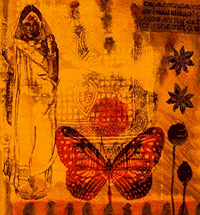 The Vedas were drawn towards the hearts of the sages of this land, this Karma-bhoomi, this Yoga-bhoomi and this Tyaga-bhoomi. Other lands pursued Bhoga and so their atmosphere was overcharged with worldly aspirations and achievements. The Vedic message could not therefore be easily understood there. Since in India, the spiritual quest was sincerely pursued, along with material objectives, people here had the good fortune of the Veda Matha, Mother Veda, incarnating.
The Vedas were drawn towards the hearts of the sages of this land, this Karma-bhoomi, this Yoga-bhoomi and this Tyaga-bhoomi. Other lands pursued Bhoga and so their atmosphere was overcharged with worldly aspirations and achievements. The Vedic message could not therefore be easily understood there. Since in India, the spiritual quest was sincerely pursued, along with material objectives, people here had the good fortune of the Veda Matha, Mother Veda, incarnating.
Of course, this does not mean that the Veda Matha has not blessed other lands or is absent therein. It is like the force of gravitation present everywhere. The Veda is omnipresent. The heroic sages of Bharath were able to receive the Vedic Message as a result of their Sadhana of denial and detachment as well as their capacity to concentrate, and to experience the Bliss resulting from practising it. They were so selfless and full of compassion and love that they shared with those who approached them what they had heard and enjoyed. They are therefore called "Manthra Drshta". Through the long line of their disciples, the message has come down the ages and spread all over the land. Like a continuing flood, the mysterious Veda was 'visualised' by the Sages as Drshtas. The Bharathiyas, people of this country, are well aware of this debt.
The Vedas are euphonic and hence the sounds are very important. The sounds and sometimes the meaning of the Vedas depend upon the correct pronunciation of the syllables along with the right intonation, duration, effort, pace and continuity. The sounds produced by the recitation of the Vedas have beneficial consequences for the person who chants it, the people who listen to it and to the environment in which it is chanted. The sounds of Vedas can purify one’s mind and also cleanse the environment of negative influences.
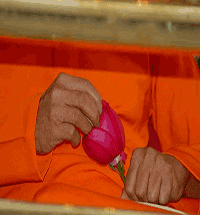 The scriptural texts of India - the Vedas, Vedangas, Upanishads, Smrthis, Puranas and Ithihasas - are repositories of profound wisdom. Each of them is an ocean of sweet sustaining milk. Each is sacred and sanctifying. The waters of the Ocean can never be diminished in volume however many pumps you ply to drain them. Enormous quantities of water are turned into steam by the hot rays of the sun, bundled into clouds, and returned to the earth as rain. This helps the harvesting of grain and renders the land green with vegetation. The wonder is that in spite of this tremendous uptake and downpour, the level of the ocean does not go down even by an inch. Furthermore, even though thousands of live rivers pour their waters into the seas; the level is not seen to increase. Similarly, the persons who have supplemented their knowledge of the scriptural texts with the awareness of their validity acquired by practising the lessons contained in them, are not affected by praise or blame, whatever the source and quantity. Their hearts will stay pure, unaffected and calm. The holy scriptures of India are strongholds of such sustaining lessons.
The scriptural texts of India - the Vedas, Vedangas, Upanishads, Smrthis, Puranas and Ithihasas - are repositories of profound wisdom. Each of them is an ocean of sweet sustaining milk. Each is sacred and sanctifying. The waters of the Ocean can never be diminished in volume however many pumps you ply to drain them. Enormous quantities of water are turned into steam by the hot rays of the sun, bundled into clouds, and returned to the earth as rain. This helps the harvesting of grain and renders the land green with vegetation. The wonder is that in spite of this tremendous uptake and downpour, the level of the ocean does not go down even by an inch. Furthermore, even though thousands of live rivers pour their waters into the seas; the level is not seen to increase. Similarly, the persons who have supplemented their knowledge of the scriptural texts with the awareness of their validity acquired by practising the lessons contained in them, are not affected by praise or blame, whatever the source and quantity. Their hearts will stay pure, unaffected and calm. The holy scriptures of India are strongholds of such sustaining lessons.
The Vedas are the oldest literary creations of man. Now the word 'literature' is used to connote writings scribbled while eager to find something to spend the time hanging on hand. They have no inner worth or significance; they destroy the traits of good character in the reader and implant bad attitudes and habits; they do not adhere to the path of Truth. But, Literature is a term that cannot be applied to writings or poems that reel off tales that are false. It should not emerge from the egotistic fancies of the individual.
The Vedas are the soul that sustains the spiritual life of Bharath; they are the breath that keeps the people alive. They possess a divine power, amazing in its effects. They are charged with the vibrations of mantras, which can be experienced by those who go through the process scientifically. They can impart also the strength derivable through symbols and formulae of Tantric nature. 'Tantra' means 'the means and methods of utilising the mantras for one's own good'. Man has physical and material power only. His Karma becomes holy and sacred when the mechanics (yantra) of life are ruled by Mantra and Tantra. The technique of this Sadhana is in the Karma Kanda of the Vedas. The ancient sages became aware of this and have preserved it for mankind in the Four Vedas.
Unable to grasp these truths, those who pride themselves as 'moderns' proclaim that the Vedas contain only verses and mantras which are learnt by rote and repeated by aged cronies. Not only 'moderns' but even those who earned distinction as "the foremost Pundits", those who expound to the people gathering fame, use the Vedas for promoting their material well-being and not for helping them on the spiritual path. They are unable to discover the sacred task for which the Vedas exist. Whenever the chance arises, they benefit by the scholarship, but they are not eager or able to use the Vedas to purify their daily lives.
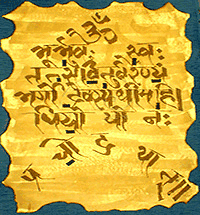 As a result, 'moderns' find it impossible to develop faith in the Vedas. When the Pundits do not seek to practise the Vedas they have learned and parade their lack of faith by not instructing their own children on the glory of the Vedas, they naturally cause lack of faith in the entire society.
As a result, 'moderns' find it impossible to develop faith in the Vedas. When the Pundits do not seek to practise the Vedas they have learned and parade their lack of faith by not instructing their own children on the glory of the Vedas, they naturally cause lack of faith in the entire society.
Many others, in spite of their ignorance of the meaning of the Vedic hymns, walk through busy places reciting the sacred texts in mechanical orthodoxy. Foreigners, - especially German scholars - though they have not learnt the Vedas by rote, have realised that the mantras possess and transmit profound power. They have during the centuries carried to their own country, portions of the Vedas and conducted patient and painstaking research on them. Consequently, they have unravelled strange mysteries. They found that the Vedas contain the secrets of all the arts which confer progress on man.
As adjuncts to the Vedas, many scriptural texts emerged. The Veda (knowledge) of Archery, the Veda of Ayu or Maintenance, Prolongation and Preservation of Life (medicine), the Veda of Planets and Stars (Jyotir Veda) - many such texts were composed and promulgated. Sage Viswamitra discovered the mantra named Gayathri, which is addressed to the energy of the Sun, Surya. This mantra has infinite potentiality. It is a vibrant formula. It has immense powers, powers that are truly amazing. For, the Sun is its presiding deity. Students of the Ramayana know hat the same sage, Viswamitra, initiated Rama into the mysteries of Sun-worship, through the mantra Aditya Hrdayam.
The Gayathri enabled Viswamitra to use rare weapons which bowed to his will when the mantra was repeated with faith. Through the powers he attained in this way, Viswamitra was able to become a great scientist and create a counterpart of this cosmos. A person who is able to increase the capabilities of his hands and his senses is now considered a 'scientist', but, the term (Vijnani) was correctly applied in the past only to those who developed spiritual power and discovered the formulae for delving into the Divine within, those imbued with faith and devotion who could spontaneously demonstrate that power in actual day to day living. On the other hand, the 'scientists' of today know only a bit here and a bit there; they exaggerate and boast of what they have managed to learn. They are fond of pomp and proud display. They rise skyhigh on the fumes of praise. Such absurdities are quite contrary to the true behaviour of a scientist. For he is humble and meek. He is aware that, however much he knows, there is a far vaster field which he has yet to know. He is conscious that Divine Grace is responsible for what little he knows.
Viswamitra was a scientist who had recognised this truth. So, there is no scientist yet greater than he was. But, though a sage of such immense eminence and with so expansive a heart lived in India, he is not remembered by the people of this land. They honour foreigners who have glimpsed his greatness; they have placed their faith in those researchers who have elicited valuable lessons from the Vedas. The Veda is the Mother of Bharat. But the children do not revere the mother any more. They revere the stepmother and believe in her! This is the result of anglicised educational system.
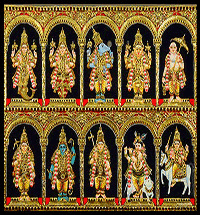 Vedanta is the legitimate property of every section, every caste, every community, and every race, of the followers of any faith and persons of both sexes. Vedanta means Wisdom or Jnana. 'Wisdom' relating to which field of knowledge? It is wisdom based on the knowledge of the Atma. This wisdom is the supremest gain that can be earned in life. What greater gain can there be for man than becoming aware of his Self, himself knowing himself. Faith in the possibility of knowing oneself is necessary for every student of Sruthi (the Vedas) and Smrthi (the Moral Codes).
Vedanta is the legitimate property of every section, every caste, every community, and every race, of the followers of any faith and persons of both sexes. Vedanta means Wisdom or Jnana. 'Wisdom' relating to which field of knowledge? It is wisdom based on the knowledge of the Atma. This wisdom is the supremest gain that can be earned in life. What greater gain can there be for man than becoming aware of his Self, himself knowing himself. Faith in the possibility of knowing oneself is necessary for every student of Sruthi (the Vedas) and Smrthi (the Moral Codes).
Of course, some men may reply that the Vedas are the authority for the existence of the Atma and that the Atma can be experienced and validated through the Vedas. The Vedas do prohibit certain activities as Un-atmic or opposed to the norms expected from a believer in the Atma; they do recommend certain other activities like charity, moral behaviour, as Atmic. But, the Atma is its own proof, its own witness. Its existence cannot be established by other facts, or things.
The Sastras, which are texts supplementary to the Vedas, declare that God resides wherever six excellences are evident: Enthusiasm (utsaha), determination (sahasam), courage (dhairya), good-sense (sad-buddhi), strength (sakti) and adventure (parakrama). The inaugural prayer of man has to be directed to God (Ganapathi) to gain these six gifts which can purify consciousness and reveal the Atma. One has to undertake the discovery of one's Atmic core, with bravery in the heart; this is no exercise for cowards. Wicked persons, waverers in faith, doubting hearts, woeful countenances, are destined to go through life as rogis (sick persons) and not yogis (dwellers in Atma).
This is the distinguishing mark that separates the 'wise' (jnani) from the 'unwise' (ajnani). Krishna spoke, laughing with an outburst of joy; Arjuna listened while over-powered by sorrow. The jnani is always full of joy; he laughs. The ajnani is afflicted with sorrow; he weeps.
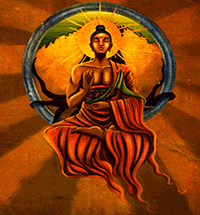 "Vetthi ithi Vedah"; Knowing, knowledge is Veda. That is to say, man can know from the Vedas, the Code of Right Activity and the Body of Right Knowledge. The Vedas teach man his duties from birth to death. They describe his rights and duties, obligations and responsibilities in all stages of life - as a student, householder, recluse and monk. In order to make plain the Vedic dicta and axioms and enable all to understand the meaning and purpose of the do's and don'ts, the Vedangas, Puranas and Epic texts appeared, in course of time. Therefore, if man is eager to grasp his own significance and true reality, he has to understand the importance of these later explanatory compositions also.
"Vetthi ithi Vedah"; Knowing, knowledge is Veda. That is to say, man can know from the Vedas, the Code of Right Activity and the Body of Right Knowledge. The Vedas teach man his duties from birth to death. They describe his rights and duties, obligations and responsibilities in all stages of life - as a student, householder, recluse and monk. In order to make plain the Vedic dicta and axioms and enable all to understand the meaning and purpose of the do's and don'ts, the Vedangas, Puranas and Epic texts appeared, in course of time. Therefore, if man is eager to grasp his own significance and true reality, he has to understand the importance of these later explanatory compositions also.
This is the reason why the ancients taught the Vedangas and other related texts even before the pupils learnt the Vedas. This was a must in the Gurukulas or Hermitage Schools of the past. In those days, the Bharathiyas studied the 'Fourteen Vidyas', or 'Subjects'. The Vedas were learnt by rote. The master of the Vedas, who had learnt the Vedas in this manner was called Jada, or Inert! But, the word did not convey the meaning that he had not known anything. It only meant that he had nothing more to learn and was therefore 'inactive' and 'content'. Through the study of the Vedas, he had become the master of all knowledge. In order to make this human career worth while, the study of the Vedas was considered very essential.
